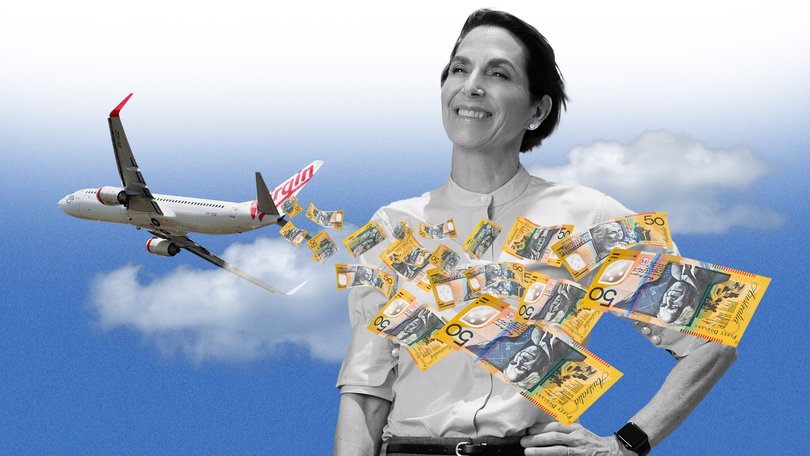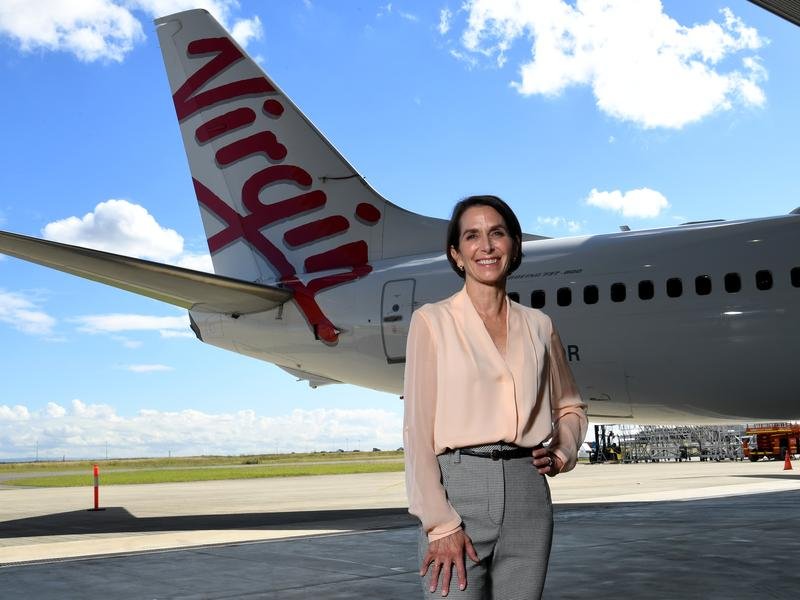JENI O’DOWD: Virgin Australia’s farewell payout of Jayne Hrdlicka is capitalism gone feral
JENI O’DOWD: When payouts hit this level, they start to look detached from performance, and that’s when public trust takes a hit.

Fifty. Million. Dollars. That’s the farewell payout Virgin Australia delivered to outgoing chief executive Jayne Hrdlicka after just four years in the top job.
Not for founding the airline, not for curing cancer, but courtesy of a management equity scheme tied to the company’s return to the ASX. The windfall, made up of shares, bonuses and other payments, comes after what Virgin’s annual report describes as years of “below market remuneration”.
This annual salary was about $1.8m in fixed pay plus short-term bonuses, according to reports last year.
Sign up to The Nightly's newsletters.
Get the first look at the digital newspaper, curated daily stories and breaking headlines delivered to your inbox.
By continuing you agree to our Terms and Privacy Policy.If that’s what below market looks like, the rest of us must be living on another planet. And the total payout? To put it in perspective, $50m is the full-time minimum wage of nearly 1015 Australians.
It also covers the full age pension for more than 1600 retirees for a year. And while families are scraping to pay for groceries and power bills, one person who presided over an airline riddled with flight changes and delays walks away with a fortune.
Even setting aside the shares, Hrdlicka’s cash bonuses and termination payments alone were worth nearly $20m, the kind of payout most Australians would never see in 10 lifetimes.
And before anyone accuses me of socialism, a payout that obscene isn’t capitalism, it’s capitalism gone feral.
This isn’t about reining in corporate success
Hrdlicka did a great job in difficult circumstances (isn’t that why she was hired?), but a $50m payout isn’t about merit. It’s about a system where corporate boards allow golden windfalls on a scale that defies reason.
She took the helm after Virgin collapsed into administration, steered it through the pandemic, slashed costs and returned the airline to profit for the first time in more than a decade. That’s no small feat.
Much of Hrdlicka’s payout is in Virgin shares that have risen in value as the airline returned to profit. But however you look at it, the headline figure is still $50m, a fortune that puts boardroom rewards in another universe from the rest of Australia.

Profitability, yes. But reliability problems, customer complaints and cost-cutting left plenty of scars. Whatever credit she deserves, the size of the payout still looks grotesque compared with the reality faced by staff and passengers.
Cabin crew, pilots, baggage handlers and call centre staff didn’t get a windfall when Virgin was restructured in 2020.
The share scheme that swelled Hrdlicka’s payout wasn’t open to Virgin’s pilots or cabin crew. They didn’t benefit from the same equity opportunities; just job cuts, wage freezes and the privilege of keeping the airline afloat.
And on Tuesday, Virgin was apologising for another scandal after a doctor and business class passenger was asked to leave the Melbourne lounge for pumping breast milk.
When the airline can’t get the basics of dignity and service right, the optics of a $50m payout to its former boss look even worse.
A retired obstetrician who safely delivered thousands of babies, or a cancer researcher who has spent a lifetime chasing cures, won’t walk away with anything like that. Most retire with a super balance that wouldn’t even cover a CEO’s car allowance.
Labor loves to talk about fairness. But fairness apparently stops at the corporate boardroom door.
Who can forget Alan Joyce? When he quit the top job, the former Qantas boss was in line for up to $24m in salary, bonuses and shares.
After scandals over illegal staff sackings and flight cancellations, nearly $10m was cut. But Joyce still collected millions, including $3.8 million in shares this year.
Meanwhile, the same leaders who wring their hands over executive pay are the first to say no to lifting JobSeeker or pension payments by a few dollars.
Other governments have at least tried to do something about huge corporate payouts. In the UK, companies must publish the ratio between CEO pay and median worker pay in laws introduced in 2019, forcing transparency.
Switzerland voted in 2013 to give shareholders binding power over executive pay. And in the US, the Dodd-Frank Act of 2010 forced disclosure of golden parachutes and introduced clawbacks.
Australia has what’s called the two-strikes rule: if a quarter of shareholders vote against a company’s executive pay report two years in a row, the entire board can be forced to face re-election.
On paper, that sounds tough. In practice, it’s flimsy. Companies aren’t required to publish pay ratios. There are no clawback laws. And golden handshakes are still taxed like ordinary income.
The guardrails exist, but they don’t stop excess when it tips into absurdity.
This isn’t about reining in corporate success. People should absolutely be free to earn what their talent and risk-taking can bring them.
But when payouts hit this level, they start to look detached from performance, and that’s when public trust takes a hit.
A government that’s serious about fairness wouldn’t cap ambition, it would demand transparency, accountability and tax golden handshakes for what they really are: extraordinary windfalls, not ordinary income.
